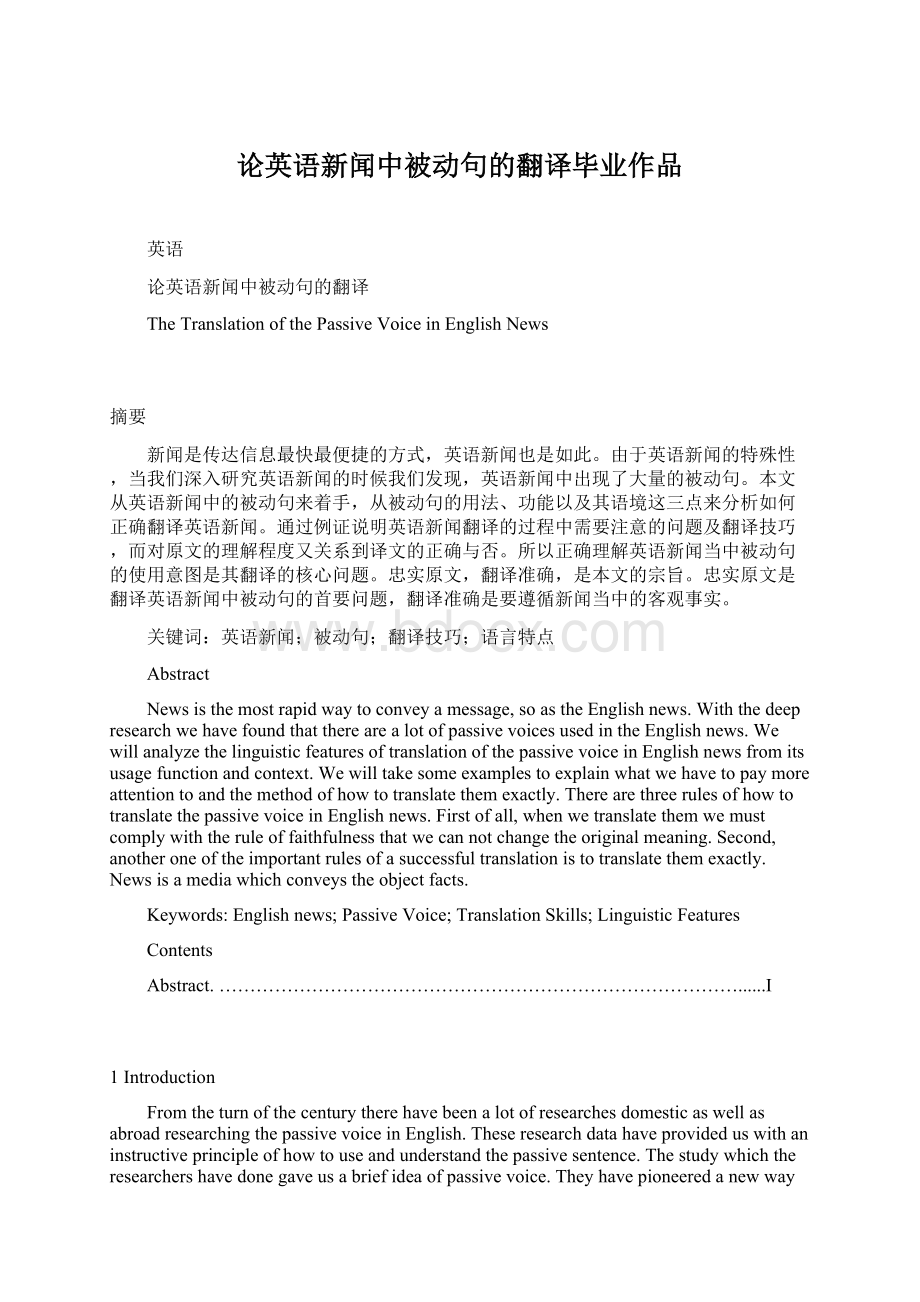论英语新闻中被动句的翻译毕业作品.docx
《论英语新闻中被动句的翻译毕业作品.docx》由会员分享,可在线阅读,更多相关《论英语新闻中被动句的翻译毕业作品.docx(11页珍藏版)》请在冰豆网上搜索。

论英语新闻中被动句的翻译毕业作品
英语
论英语新闻中被动句的翻译
TheTranslationofthePassiveVoiceinEnglishNews
摘要
新闻是传达信息最快最便捷的方式,英语新闻也是如此。
由于英语新闻的特殊性,当我们深入研究英语新闻的时候我们发现,英语新闻中出现了大量的被动句。
本文从英语新闻中的被动句来着手,从被动句的用法、功能以及其语境这三点来分析如何正确翻译英语新闻。
通过例证说明英语新闻翻译的过程中需要注意的问题及翻译技巧,而对原文的理解程度又关系到译文的正确与否。
所以正确理解英语新闻当中被动句的使用意图是其翻译的核心问题。
忠实原文,翻译准确,是本文的宗旨。
忠实原文是翻译英语新闻中被动句的首要问题,翻译准确是要遵循新闻当中的客观事实。
关键词:
英语新闻;被动句;翻译技巧;语言特点
Abstract
Newsisthemostrapidwaytoconveyamessage,soastheEnglishnews.WiththedeepresearchwehavefoundthattherearealotofpassivevoicesusedintheEnglishnews.WewillanalyzethelinguisticfeaturesoftranslationofthepassivevoiceinEnglishnewsfromitsusagefunctionandcontext.Wewilltakesomeexamplestoexplainwhatwehavetopaymoreattentiontoandthemethodofhowtotranslatethemexactly.TherearethreerulesofhowtotranslatethepassivevoiceinEnglishnews.Firstofall,whenwetranslatethemwemustcomplywiththeruleoffaithfulnessthatwecannotchangetheoriginalmeaning.Second,anotheroneoftheimportantrulesofasuccessfultranslationistotranslatethemexactly.Newsisamediawhichconveystheobjectfacts.
Keywords:
Englishnews;PassiveVoice;TranslationSkills;LinguisticFeatures
Contents
Abstract.…………………………………………………………………………......Ⅰ
1Introduction
FromtheturnofthecenturytherehavebeenalotofresearchesdomesticaswellasabroadresearchingthepassivevoiceinEnglish.Theseresearchdatahaveprovideduswithaninstructiveprincipleofhowtouseandunderstandthepassivesentence.Thestudywhichtheresearchershavedonegaveusabriefideaofpassivevoice.Theyhavepioneeredanewwaytoacknowledgeandmasterthepassivevoice.However,therearelittlestudieswhichresearchthetranslationofpassivevoiceinEnglishnews.Inourmodernsociety,Newsisthecommunicationofselectedinformationoncurrenteventswhichispresentedbyprint,broadcast,Internet,orwordofmouthtoathirdpartyormassaudience.Newsisthemostrapidwaytoconveyamessage.Nodoubtthatnewsisthemainmedia.Weknowtheworldformthenews.Wegettheinformationfromthenews.Thesignificanceofnewscannotbeenignored.ThereisoneofthemainlinguisticfeaturesofEnglishnewsisthatthelargeuseofpassivevoice.ItssignificanceurgesustostudythepassivevoiceinEnglishnews.ThisarticlewillstartwiththedefinitionsofthepassivevoiceinEnglishandChinese,andthenmoveontothefunctionsofthepassivevoiceinEnglish,withanaimtocastalightonthetranslation.Inthisarticle,wewillanalyzethetranslationofthepassivevoiceinEnglishnewsfromanewpointofview.
2ThePassiveVoice
2.1TheDefinitionofVoice
Ingrammar,thevoice(alsocalleddiathesis)ofaverbdescribestherelationshipbetweentheaction(orstate)thattheverbexpressesandtheparticipantsidentifiedbyitsarguments(subject,object,etc.).Whenthesubjectistheagentordoeroftheaction,theverbisintheactivevoice.Whenthesubjectisthepatient,targetorundergoeroftheaction,itissaidtobeinthepassivevoice.
2.1.1Active
Theactivevoiceisthemostcommonlyusedinmanylanguagesandrepresentsthe"normal"case,inwhichthesubjectoftheverbistheagent.Suchas:
(1)Ieatthecake.
ThewordIisthesubject,whilethewordcakeisobject.ThewordIusestheactiontoeatthecake.
(1)我吃了蛋糕。
2.1.2Passive
Thepassivevoiceisemployedinaclausewhosesubjectexpressesthethemeorpatientoftheverb.Thatis,itundergoesanactionorhasitsstatechanged.TheSpanishlanguageandtheEnglishlanguageuseaperiphrasticpassivevoice;thatis,itisnotasinglewordform,butratheraconstructionmakinguseofotherwordforms.Specifically,itismadeupofaformoftheauxiliaryverbtobeandapastparticipleofthemainverb.
2.2TheDefinitionofPassiveVoice
Passivevoiceisagrammaticalvoicecommoninmanyoftheworld'slanguages.Passiveisusedinaclausewhosesubjectexpressesthethemeorpatientofthemainverb.Thatis,thesubjectundergoesanactionorhasitsstatechanged.Asentencewhosethemeismarkedasgrammaticalsubjectiscalledapassivesentence.Incontrast,asentenceinwhichthesubjecthastheagentroleiscalledanactivesentence,anditsverbisexpressedinactivevoice.Manylanguageshavebothanactiveandapassivevoice;thisallowsforgreaterflexibilityinsentenceconstruction,aseitherthesemanticagentorpatientmaytakethesyntacticroleofsubject.
Transforminganactiveverbintoapassiveverbisavalence-decreasingprocess("detransitivizingprocess"),becauseittransformstransitiveverbsintointransitiveverbs.Suchas:
(2)Thecakewaseatenbyme.
Thisisthepassivesentenceoftheexample
(1).Inthissentence,thewordcakeisthesubject,whilethewordIistheobject.
(2)蛋糕被我吃了。
Theuseofpassivevoiceallowsspeakerstoorganizestretchesofdiscoursebyplacingfiguresotherthantheagentinsubjectposition.Thismaybeusedtoforegroundthepatient,recipient,orotherthematicrole.Passivevoicemayalsobeusefulwhenthesemanticpatientisthetopicofon-goingdiscussion.
English,likesomeotherlanguages,usesaperiphrasticpassive.Ratherthanconjugatingdirectlyforvoice,Englishusesthepastparticipleformoftheverbplusanauxiliaryverb,eitherbeorget,toindicatepassivevoice.
Theexample
(1)and
(2)arethesamemeaningandtheycantransfertoeachother.Butifonewantstoknowwherethecakeis,thenwecanuse
(2).Andifoneisaskedwhathe/sheisdoing.Theexample
(1)isthebestanswer.Fromthesetwodifferentsentences,itiscleartousthatthepassivehaveitsownadvantage.
TheactivevoiceisthedominantvoiceinEnglishatlarge.Manycommentators,notablyGeorgeOrwellinhisessay"PoliticsandtheEnglishLanguage"(1946)andStrunk&WhiteinTheElementsofStyle(1918),haveurgedminimizinguseofthepassivevoice.However,thepassivevoicehasimportantuses.JanFreemanofTheBostonGlobe(1993)states"allgoodwritersusethepassivevoice"–includingOrwellandStrunk&Whitethemselves,inthesectionsoftheiressayscriticizingthepassivevoice.Thereisgeneralagreementthatthepassivevoiceisusefulforemphasis,orwhenthereceiveroftheactionismoreimportantthantheactor.
2.3TheDifferencebetweenChinesePassiveVoiceandEnglishPassiveVoice
Asweallknow,nearlyallthelanguagehavethepassivevoice.Inthissection,IwillemphasisonthedifferencebetweenChinesePassiveVoiceandEnglishPassiveVoice.
InChinese,weuseonepassivewordtoexpressthepassivevoice,however,inEnglish,wehavetochangethegrammarvoiceoftheverbtoexpressthepassivevoice.Forexample:
(3)Themosquitobitesme;
(4)Iambitbythemosquito.
Theverbbitechangestoitspassivevoicebit,andthepronunciationrelativelychanges.Thepassivesentenceusesaprepositionbytoexpressthatthemosquitoistheactorwhoisthesubjectoftheactivesentence.Howeverwedon’thavetochangetheformationoftheverbinChinese,andweuseanewpassivewordtoexpressthepassivemeaning.Incontrast,wehavetochangetheformationandthepronunciationofaverbwhenthepassivevoiceisnecessary.
Therefore,wehavetorememberthepassivevoiceofaverbwhenwelearnEnglish.ItcanhelpustoreadEnglishmoreeffectively.
WhenisthepassivelikelytoappearinEnglish?
Whichgenreweusepassivelargely?
HowcanwetranslatethepassiveintoChinese?
2.4ThePassiveVoiceinEnglish
Inourlife,passivevoiceisnotwidelyused.Wetendtousetheactivevoicetoexpressourselves,whichmeansthatinspokenlanguagepassivevoiceisnotwidelyused.Therefore,whenthepassiveislikelytoappear?
Theresearchershavefoundthatweusemanypercentspassivevoiceinthenewsandtechnologicalarticle.
Tosomeextent,thefunctionofthepassivedeterminesthedistributionoftheuseofthepassive.Justastheoutcomeoftheresearchshowsthatinnewandtechnologicalarticlesusemanypercentspassivevoice,however,innovelsandourdailyconversationusesmerelylittlepercentspassivevoice.ThedifferencebetweenmodernEnglishandmodernChineseistheusagethepassive,inmodernChinese,wedon’tusealotofpassive,whileinEnglishweusealotofpassive.
3TheFunctionofthePassiveVoice
3.1PragmaticFunction
EnglishpassivesentencesarenotthesolelysimplesubstitutingformsoftheircorrespondingEnglishactivesentences,butpossessparticulartextual,pragmaticandrhetoricapplicationsinverbalcommunication.Basedontheanalysisofdata,thisresearchhasexploredfactorsininfluencingandrestrictingtheapplicationofEnglishpassivesentences.Finally,iscomestorealizethat:
theselectionofEnglishpassivesentenceisduetocomprehensivefunctioningoftheirfunctions,contexts,registers,idiolects,andwrittenorspokenlanguage;theformingandselectionofsyntaxbeholdsparticularpragmaticgroundtoreachexpectedpurposes,andthereisnoexceptionforthecasaofEnglishpassivesentences.
ThelargeuseofpassiveinEnglishnewsshowsusthatgraspingthemeaningsishelpfulforustounderstandthenews.ForourChineseEnglishlearners,theprocessoflearningEnglishistheprocessoftranslatingEnglishintoChineseinourmind.InordertounderstandtheEnglishwehavetotranslatetheEnglishintoChinese.ThisprocessisthebestwaytomastertheEnglish.Therefore,howtotranslatetheseEnglishintoChineseisthetopicwehavetoknow.TheeffectivewaytotranslatetheEnglishintoChineseistoresearchthemindifferentaspects.Thistopicmakesustothinkoverthereasonsoftheappearanceofpassive.Andletus